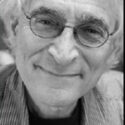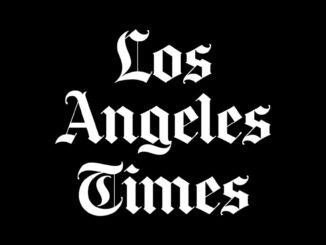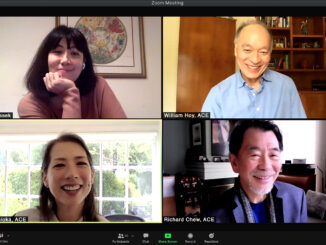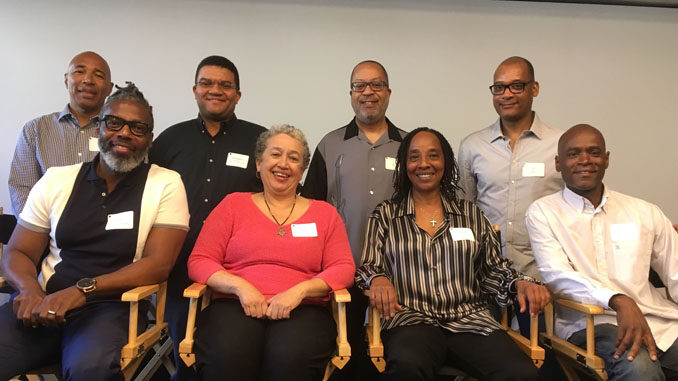
by Edward Landler
As Editors Guild members filled the Dede Allen Seminar Room at the Guild’s LA offices on Saturday morning, October 14, they were met by a seamlessly flowing slide show projected on a wall depicting title art from both features and TV shows with credits for their African-American picture editing and sound personnel, welcoming them to a panel discussion devoted to the Art of Mentoring, presented by the Diversity Committee’s African-American Steering Committee.
Watching this, committee member and panel co-moderator Lillian Benson, ACE, told CineMontage that she was shocked to learn that Hugh A. Robertson, the Oscar-nominated editor for Midnight Cowboy (1969), was African-American — “the price you pay for being below-the-line is that you are a hidden figure,” she said. “This kind of gathering helps correct that.”
As a networking tool, the gathering also attracted members like assistant editor Libya El-Amin, an eight-year member who has moved from reality to scripted TV. She said, “I am interested in mentoring young post-production assistants to bring them up into assistant editing, and I want to be trained for the next step to get to be an editor.” Picture editor Collin Taylor added, “I don’t get to go to a lot of Guild events because I’m always working — but this morning something told me I need to get up and go.”

The panel members were:
Picture editor Monty DeGraff (Daredevil, 2015-present; Lie to Me, 2009-11; Law and Order, 1990-2010)
ADR/Foley mixer Jesse Dodd, CAS, MPSE (over 300 credits, including Veep, 2012-present; Scandal, 2012-present; Arli$$, 1996-2002)
Assistant editor Wellington Harrison (Transformers: Robots in Disguise, 2014-present; Raising Whitley, 2013-present; The Ultimate Fighter, 2005-present)
Supervising sound editor Gregory Hedgepath, MPSE (Straight Outta Compton, 2015; The Hunger Games, 2012; Blade, 1998)
Music editor Del Spiva, MPSE (Genius, 2017-present; August: Osage County, 2013; American Gangster, 2007)
Picture editor James D. Wilcox (Hawaii Five-O, 2010-present; CSI: Miami, 2002-2012; My Wife and Kids, 2001-2005)
And co-moderators:
Benson (Chicago Med, 2015-present; Maya Angelou and Still I Rise, 2016; Eyes on the Prize II, 1990); and
African-American Steering Committee chair Leander Sales (Girl Six, 1996; Malcolm X, 1992; Mo’ Better Blues, 1990)
Sales welcomed the audience, saying, “This feels like a family reunion,” and introduced the panel’s sound personnel. Benson reinforced that feeling with the picture side of the panel by noting that DeGraff had mentored Wilcox who went on to mentor Harrison, and that she herself had mentored picture editor Shannon Davis, who had mentored assistant editor Halima Gilliam.
“Sometimes you mentor just by showing up,” Benson said. She recalled her own mentors, including the late New York editor Joe Staton, “who became a friend for my entire life,” and another who (she found out years later) had kept her “from moving ahead when I was perceived as a threat.” With that, she asked the panelists about the experiences that taught them how to mentor.

DeGraff felt he never had a specific mentor when he was an assistant, but offered, “You can still learn important things from the editor; I learned you don’t go for second best… As an editor, I am grateful to have an assistant I click with. As I get older, I am more focused on mentoring.”
Recently, working with Dorian Harris, ACE, on The Man in the High Castle (2015-present), he explained, “I learned only 22 percent of editors are women. It’s important to mentor women, as well. It’s an honor to help someone.”
“There’s history in this room,” Wilcox declared, acknowledging Benson as the first African-American woman member of American Cinema Editors (ACE), and that, on the TV series Soul Food (2000-2004), “Monty, Lillian and I all worked together.” His experiences as a TV news editor and in documentaries “melded together for Soul Food where I learned to look beyond the script to structure things.” Another Soul Food editor also brought Wilcox on to Dark Angel (2000-2002), created by James Cameron.
Explaining his version of mentoring, Wilcox said, “I call Monty about situations at work and I have people like [fellow panelist] Wellington calling me… I’m still in search of mentors because I want to keep learning.”
Harrison described what he seeks in a mentor: “The most valuable thing is to have conversations. An editor doesn’t necessarily know how to drive the Avid, but they know how to edit. It’s not about how to drive the car, but how to know where you’re going.”
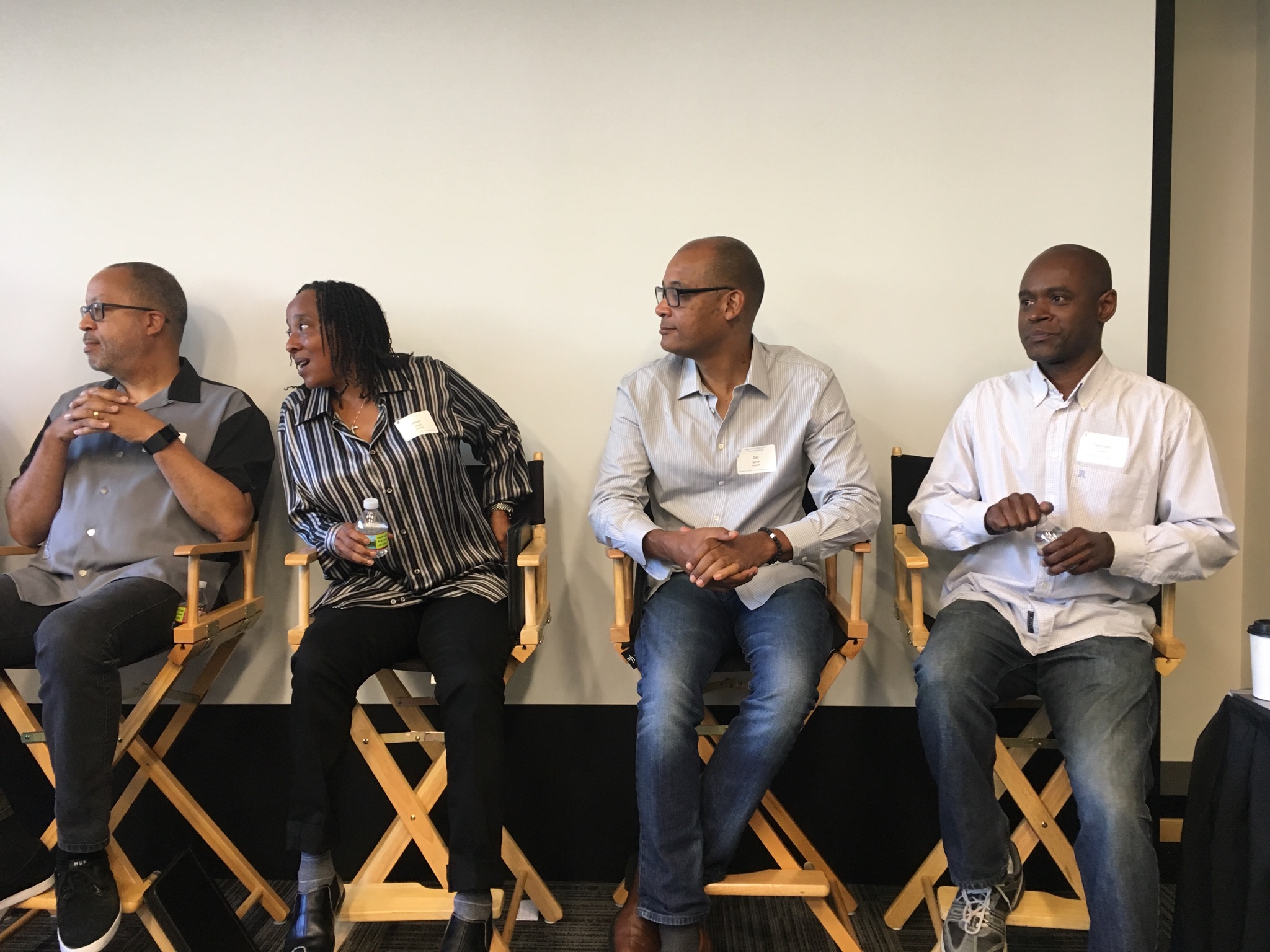
Harrison went into post-production after working in architecture for 12 years. On his first film job, he was disappointed being assigned to edit a documentary about the Buffalo Zoo: “Then I found I liked it and, ever since then, I’ve known it’s the constant pursuit of story that’s most important.”
Turning to Hedgepath, Sales said that for his own first film job, on Spike Lee’s School Days (1988), “I got to edit footsteps. It baffles me what you can do with sound.”
“Baffles me, too,” the sound editor responded. While Hedgepath said he had no specific mentors, a lot of people helped him along the way. As an example, he recalled working with sound editor Bobbi Banks, MPSE, on 35 shows doing dialogue and ADR.
He also pointed out, “Bad things can happen, too, but you get to that Zen place to learn from it. At Lucasfilm, all I wanted to do was mix, but they had me putting systems together…and I learned how it was all put together.” As for how he mentors, he explained, “People come to me for suggestions — not necessarily Black people because they’re not a lot out there.”
Like a host of others in the 1990s, Dodd learned her craft under the tutelage of recordist and re-recording mixer Corey Bailey at Cannon Films. With no other Black mixer in the industry doing ADR at her level, she doesn’t turn down work. “You just have to suit up and show up,” she offered. “The good thing for me is, they’re paying me to play.”
She realized, though, that the isolation of her job makes it harder to provide mentoring. “We used to have recordists; now Pro Tools is my recordist,” she said. “If anyone out there wants to do audio mixing, it’s a little more of a challenge to get to us, but it’s do-able. I’m at Universal ADR 7.” Benson agreed, adding, “It’s not by osmosis — you have to actively engage.”
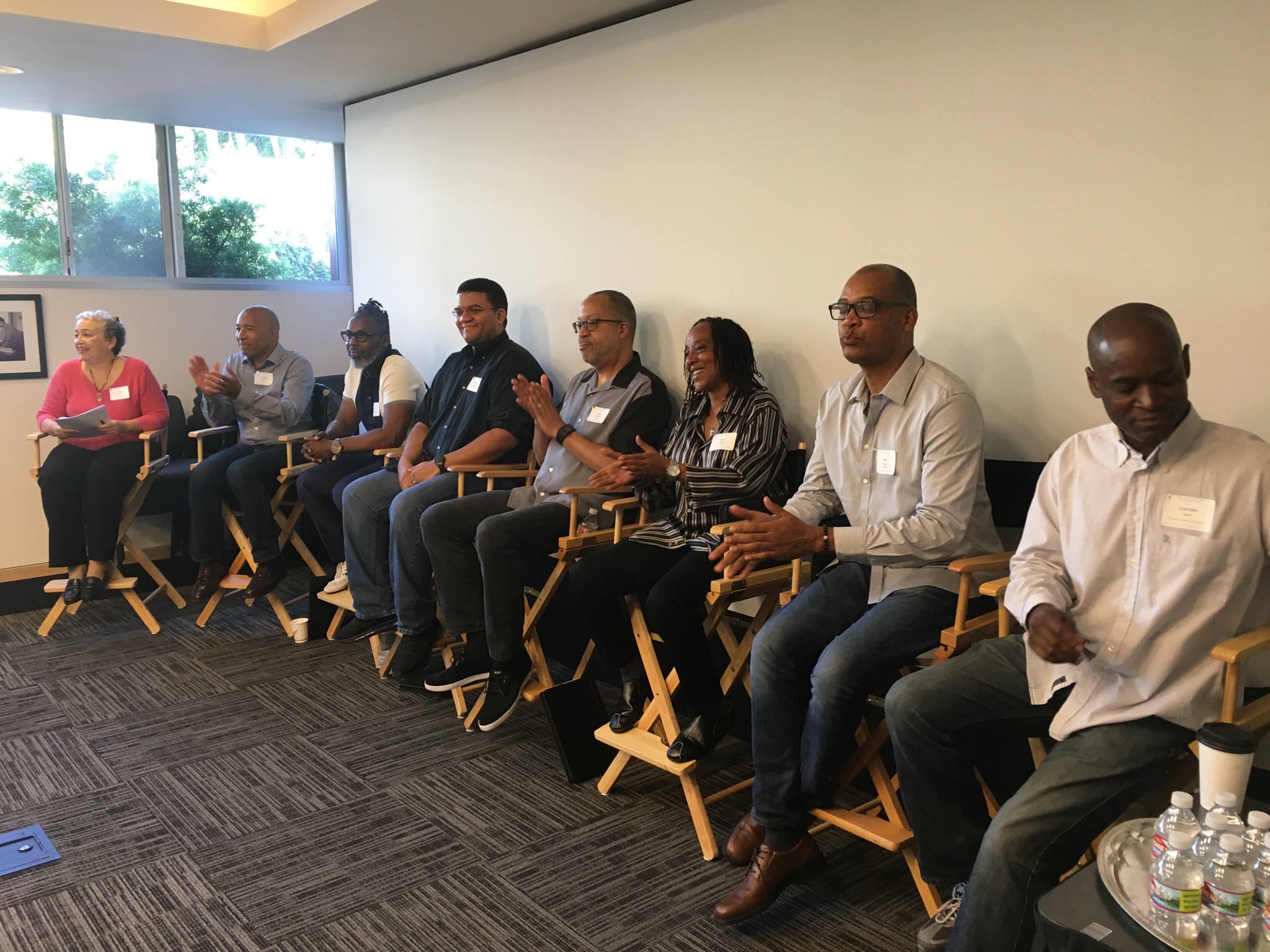
“It’s great talk and you get a recharge,” said Spiva. He called out the names of the people in the room who have been his mentors: Hedgepath, music editor Marc Streitenfeld, sound editor Teri Dormand, picture editor Terilyn Shropshire, ACE — and urged the audience, “As you move from one project to another, don’t forget there’s someone who can help you along and who can use that recharge, too.”
Bringing up another challenge mentors can help with, Spiva added, “There are people you’re going to work with who have problematic personalities, and you will see there are others who can weather those personalities. You learn how to deal with it and you get stronger.”
Editor Wilcox affirmed: “When someone sees your resume, and sees you’ve worked with difficult people, that’s a come-up.” For DeGraff, it was a question of emotional awareness. “People use their creativity not just in their craft but in their career,” he said.
Recalling his first industry job on MacGyver (1985-92), DeGraff continued, “The editor was fired and he told me, ‘I’m not worried, I’ll find another job.’ Next week he was working with Michael Mann. There are lots of opportunities around us, and you have to be aware of where they are.”
He related that, following an inner voice, he once asked someone for a meeting and got it because, without his knowledge, “an editor I’d worked with had told him I was ready for an opportunity. How do you know if you’re ready or not? Like Lillian said earlier, “Those around you should know.’”
Benson added, “Sometimes a door that was closed does not stay closed. But you have to find time to work on your craft. If you want to be an editor, you have to cut. No matter what, we have to deliver the ball in the strike zone.”

Working as a news editor, Wilcox had a mentor who told him to watch commercials without the sound and describe what the ads are saying. Having learned from such exercises, when he now watches a scene he cut, “I can tell if I was drinking too much coffee…and I need the space to see that.”
Before opening up the discussion to the audience, Sales said, “Everyone mentoring when we were coming up is still mentoring today. I’ve had so much fun working with Black crews who are interested in bringing more people in.”
Diversity Committee member Mary DeChambres, ACE, wondered if women are held to a higher standard just to see if they’re equal to men. Dodd responded, “That’s reality in the industry. To this day, people walk into my bay and think I’m the person who brought the food. Whatever their color, women are held to a higher standard.”
She continued: “It’s the females who don’t want to support one another that break my heart — especially when it’s a woman of color. I can deal with testosterone; when I step up to a man, they stop what they’re doing.”
Hedgepath said, “People just want to see that you’re engaged,” while Spiva noted, “You’ve got to read the personalities.” Dodd agreed, adding, “There’s a talent level beaming out every time you walk into a room. In some rooms, I say a lot more and, in others, I don’t say so much.”
Diversity Committee co-chair Maysie Hoy, ACE, asked what kept the panelists centered. DeGraff answered, “I remove myself and say, ‘I can do this, keep on cutting.’ We shouldn’t be forced to be really good, but it’s nothing to lean back from.” Hedgepath recalled comedian Chris Rock’s line — “There will really be equality when Black people are allowed to suck…”
“And not lose their job,” Dodd added, laughing. “My job is to make your day better as well as mine.”
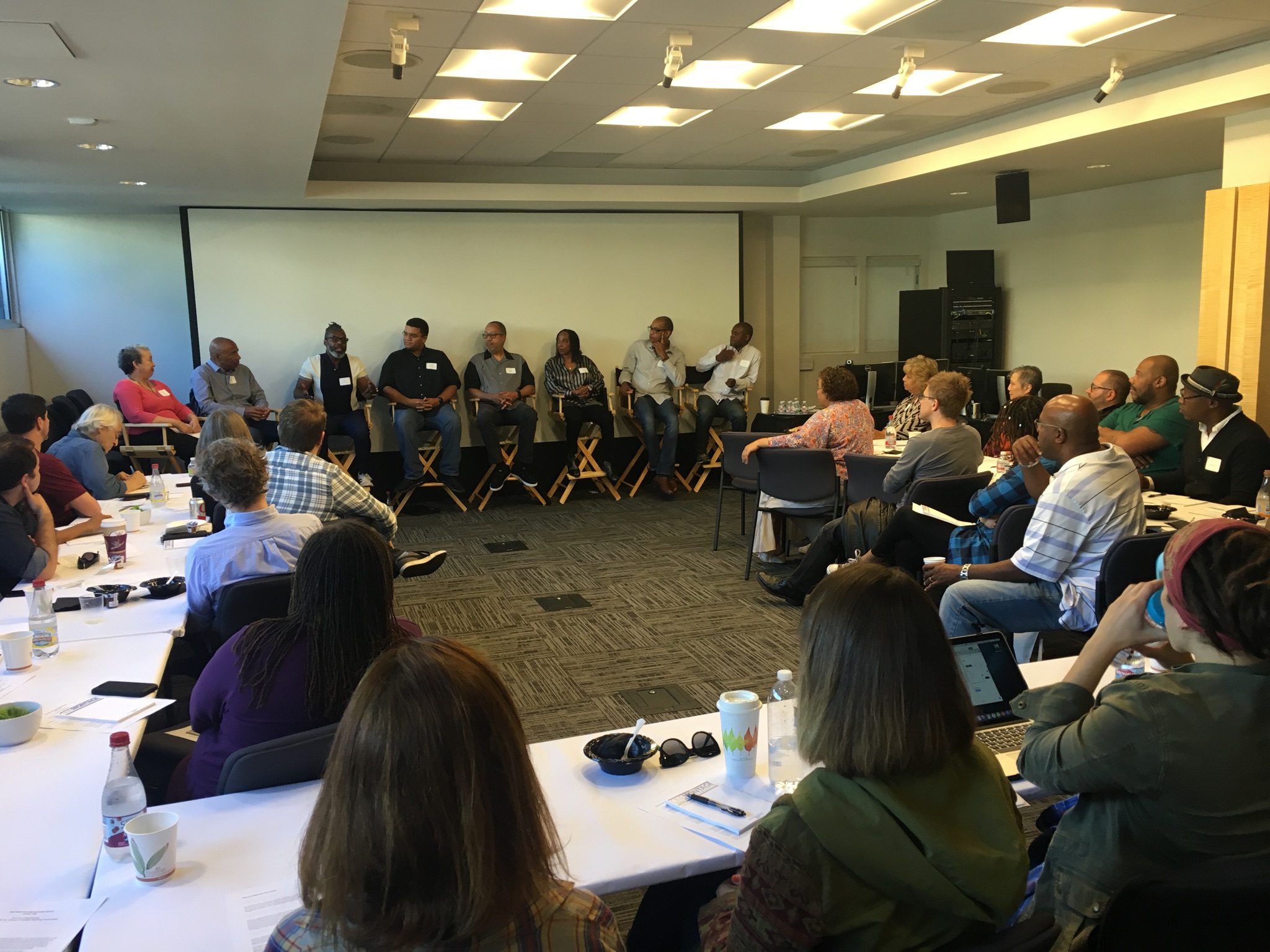
At the end of a bad day, though, Harrison said, “I come home with my guns out and my wife says, ‘When you’re done being mad, tell me what you’re going to do about it,’ and I’m thinking again. Having a great anchor is important.”
“I am an artist whether anyone else knows it or not,” stated Benson. “In docs, my mantra is, ‘I serve the truth.’” Looking further beyond the cutting room, Sales added, “I’ve been in Africa six times, in villages that were very poor…but they had family and they had everything.”
Assistant editor Michael Jones turned the discussion toward office politics. DeGraff encouraged him to ask questions: “Your curiosity will be answered, and the more information you have, the more you can advocate for yourself.”
Following up, Wilcox said, “Talk to your editor to see what the priority is, and learn the decorum you need to have in the editing room.” Spiva suggested, “You look forward to whatever the next thing is. You have to be able to move without being caught off guard.”
Assistant editor Karen Goffred asked, “How do you split the time to work with great editors who may not be good teachers, and editors who are not as well-known who are really good mentors?” DeGraff replied, “No single person can provide everything for you. Having the clarity to know what you want will lead you to the people you need to work with.”
Finally, picture editor Tricia Rodrigo spoke out: “I’ve always felt alone working in a dark box, but I don’t feel alone here. How do we find each other?” Dodd answered directly: “This is how we find each other. Let’s do more of these. Socialize.”
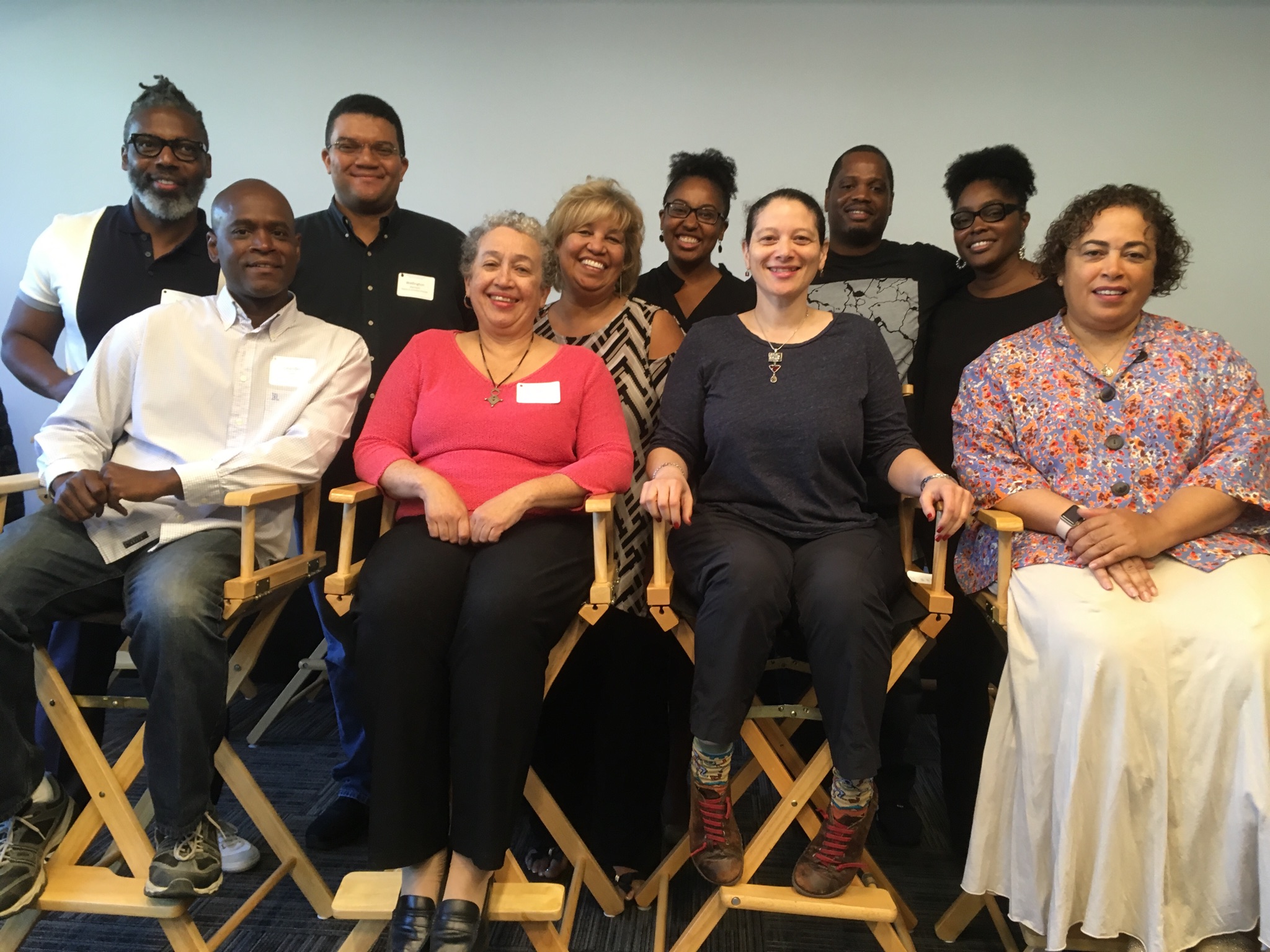
With that, Sales asked everyone to fill out distributed information forms so all could stay in touch, while the Diversity and Steering Committee members all stood for discussions to continue in smaller groups… and the talk kept going over chicken wings and all the other dishes provided for lunch.
An assistant editor now for two years, Alanah Jones told CineMontage, “The insights that some of these people shared answered questions that I didn’t even know I had. Many different people can mentor you in many different ways, but the most important thing is finding someone you can relate to and learn something from.”
Rodrigo’s comment justified the entire event for Diversity and Steering Committee member Gilliam, who was also “really pleased to see the numbers of diverse people other than those of color here today.”
Assistant editor Stephanie Taylor, said, “Anything involving diversity is important to me. Editor Lee Haxall, a woman, brought me into scripted TV. This gives me hope that there is a place in the industry for people of talent and ability, regardless of their color or gender.”
Editor George Pilkinton said, “It’s a good opportunity for all of us who came to consider both the individual effect a mentor can have and what we all can do to make our work places look more like America.”
“Everyone had the chance to share their stories because the connections are so strong,” concluded Sales. “This is just the beginning.”
The African-American Steering Committee members are Bobbi Banks, Lillian Benson, James Wilcox, Shannon Davis, Halima Gilliam, Michael Jones, Charles Little II, Leander Sales and Terilyn Shropshire.


